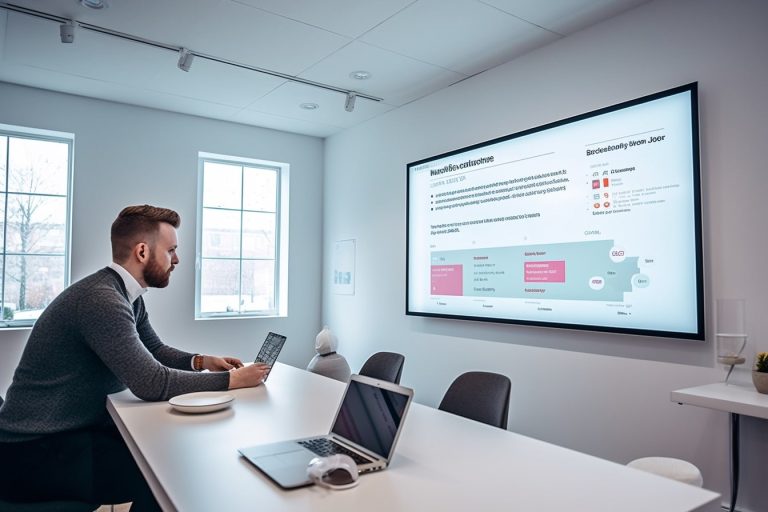Ensuring Security on Your WordPress Website
Did you know nearly half of websites use WordPress? Yet, many overlook critical security steps needed for their site’s safety. With WordPress running over 43% of websites, its protection cannot be ignored. Its open-source nature invites hackers to try and breach its defences. So, to keep your site safe from malware and threats, it’s crucial to apply regular patches and updates.
WordPress security is a continual effort, not a one-time fix. The ever-changing nature of cyber threats requires constant vigilance and updates. By understanding key risks and employing effective security measures, your WordPress site can stay secure.
Key Takeaways
- Regular updates and patches are crucial for maintaining a secure WordPress site.
- Understanding common vulnerabilities helps in preempting potential security threats.
- Utilising robust security plugins and tools can significantly enhance site protection.
- Strong passwords, incorporating various characters, are essential for login security.
- Regular maintenance and security audits are vital for long-term WordPress site security.
Why WordPress Security is Important
In today’s world, keeping your WordPress site safe is key to its success and trustworthiness. With over half of the websites using WordPress 5.9, it’s a big target for hackers. We need to strengthen our sites to keep them safe.
Protecting Information and Reputation
Keeping data safe is crucial. Hackers can steal personal information, leading to identity theft. This can seriously harm your site’s reputation. By showing we protect data, we make visitors feel safe.
Visitor Trust and Expectation
People expect to feel secure online. Using SSL technology helps encrypt information, making visitors trust your site more. Google also prefers secure sites, which helps with being seen online. This meets user expectations and boosts search engine visibility.
SEO and Search Engine Rankings
Website security affects SEO. Google looks at website safety when ranking sites. Secure sites rank better. Using security plugins like BlogVault and MalCare helps defend against attacks. This also helps your website rank higher in search engines.
So, focusing on WordPress security helps protect data, keeps your reputation intact, gains trust, and improves Google rankings. Being alert and proactive helps keep our digital space safe.
Common WordPress Security Issues
Securing your WordPress website is crucial. You need to know the common threats it faces. This helps you take steps to protect your site.
Brute-Force Login Attempts
Brute-force attacks try to guess your login details. These attacks are common but can be stopped. Use strong passwords and two-factor authentication. Limit login tries too. It boosts your site’s security.
Cross-Site Scripting (XSS)
Stopping cross-site scripting is key for safety. In XSS attacks, bad actors put harmful scripts on your pages. These scripts can steal info or spoil your site. Keep themes and plugins updated. Follow safe coding to lessen XSS risks.
Database Injections
SQL injections attack your site’s database. They try to get or change data. Secure your database and use prepared statements in queries. Doing regular security checks helps find weak spots.
Backdoors and Denial-of-Service (DoS) Attacks
Backdoor vulnerabilities let attackers skip login steps. They get lasting access to your site. Remove plugins you don’t need and check for backdoors. For DoS attacks, set up rate limits and security plugins. These steps keep your website running for genuine users.
Choosing Secure WordPress Hosting
The journey to secure your WordPress site begins with the right hosting solution. Many people may not think much about it. Yet, this choice is critical for the security of our websites. We’ll look at key factors for choosing secure hosting to protect our WordPress sites.
Managed WordPress Hosting
Services like those from SiteGround are top choices for Managed WordPress. They offer secure hosting solutions that do a lot for you. They take care of automatic updates, daily backups, and advanced security features. This means site owners can relax. Professionals are handling the maintenance work. This is crucial since 90% of cyber attacks come from outdated applications. A host that keeps things updated is key.
For instance, over 80% of data breaches are due to weak passwords. Using a service that insists on strong passwords really strengthens your site’s defences.

Cloud Hosting Options
Cloud hosting is great for those with tech know-how. Companies like Cloudways provide advanced security options. These options meet today’s high web security standards. Cloud hosting’s best feature is how it scales. It grows with your traffic without letting security slide. This is essential for guarding against brute force attacks, which test many password combinations fast.
When picking a host, look at all the security features offered. Features like real-time backups, malware checks, and defense against brute force attacks are vital. Jetpack Security, for example, blocks and logs these attack attempts. This offers insights into possible dangers. It’s important to note, only 36% of WordPress users keep their themes and plugins updated. So, a secure host providing automated updates proves invaluable.
Whether you choose managed services or cloud hosting, the right secure WordPress host is crucial. It helps lower risks and keeps your site safe and sound.
Essential Security Plugins for WordPress
Every WordPress site needs to protect against hackers. Roughly 90,000 attacks happen every minute on these sites. To keep your site safe, you need good security plugins. Let’s look at some key ones.
iThemes Security
iThemes Security has been downloaded over 1,000,000 times and has a 4.6/5 rating. It is great for big websites. This plugin has many safety features, like two-factor authentication and scheduled backups. It offers more than 30 ways to protect your site. The starting price for the premium version is $99 a year.
UpdraftPlus for Backups
Having reliable backups is very important for website security. UpdraftPlus is excellent for this, offering easy site restoration. If your site is hit by malware or another issue, UpdraftPlus helps you recover quickly. You won’t lose data or functionality.
WP Activity Log
It’s vital to watch what happens on your WordPress site to catch security problems early. WP Activity Log lets admins track user actions as they happen. It gives a detailed record of changes. This plugin works well with others, like WooCommerce. WP Activity Log’s premium plans start at $99 a year, offering good value for detailed site monitoring.
Using these security plugins makes your WordPress site much safer. They are user-friendly and powerful, making them must-haves for keeping your site secure online.
Implementing Strong Login Practices
It’s critical to have strong login methods for keeping your WordPress site safe. WordPress is used by more than 43% of websites, attracting hackers. To fight unwanted access, we can take steps to make logging in more secure.
Two-Factor Authentication (2FA)
Two-factor authentication (2FA) adds security by needing two types of passwords. One is your regular password. The other, a temporary code, changes every 30 seconds. Plugins like Two-Factor, WP 2FA, or miniOrange’s Google Authenticator help a lot with this.
Limiting Login Attempts
Setting a cap on login tries helps stop brute-force attacks. Tools such as Limit Login Attempts Reloaded, Loginizer, and WPS Limit Login stop more tries after some failures. This helps keep hackers out.
Changing Default Login URLs
Changing your login page’s web address is another smart move. You can do this with security plugins or ones like WPS Hide Login specifically made for it. Harder-to-find login pages give you better security.
Strong passwords are also key. A password with 8 characters can be hacked in minutes, but one with 16 takes billions of years! Password managers like 1Password create and remember tough passwords for you.
Finally, turning off login hints helps too. WordPress might give away clues after wrong login tries. You can stop this by adding specific code to the WordPress functions.php file. It keeps your site’s details safe.
By using two-factor authentication, limiting login tries, hiding login pages, and making sure passwords are strong, we make our first line of defence stronger. It helps keep WordPress sites safer from attacks.
Regular WordPress Maintenance
Keeping a WordPress site safe and efficient is very important. Regular maintenance is key to this goal. It’s not just about updating the WordPress core, plugins, and themes. It’s also vital to conduct security audits regularly. These checks help find and fix potential security issues quickly. This careful maintenance keeps my WordPress site working well. It lowers risks and boosts security.
Updating WordPress Core, Plugins, and Themes
Regular updates to the WordPress core, plugins, and themes are necessary. These updates bring the latest security improvements and new features. MalCare uses over 100 signals to spot malware, making it better than old systems. Its one-click tool removes malware without harming the site.
Conducting Regular Security Audits
Security checks are crucial for keeping WordPress safe. Tools like MalCare’s firewall help a lot. This firewall fights off new threats and stops harmful bots, saving bandwidth. Using MalCare’s activity logs makes figuring out security issues easier. Also, cleaning the database with MalCare’s tips speeds up my website.
Maintenance isn’t just about security. It also means removing spam comments, fixing broken links, and making images load faster. For sites with lots of visitors, checking these every three months is good. Less busy sites can check every six months. By following these steps and using MalCare’s advice, my WordPress site stays safe, fast, and dependable.








